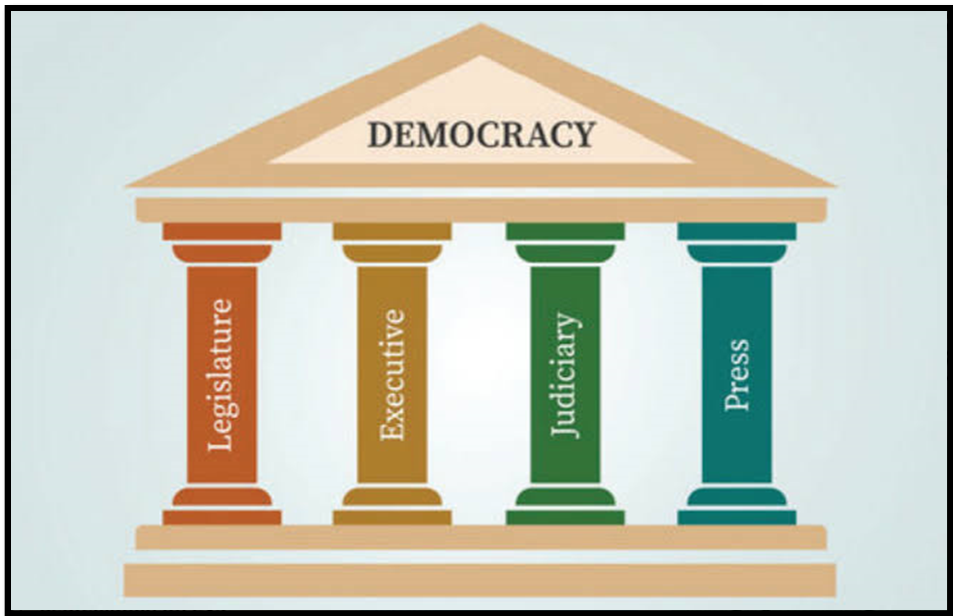REVIVING DEMOCRACY: INDIA’S DEMOCRATIC LANDSCAPE
Syllabus:
GS 2:
- Comparison of the Indian Constitutional Scheme with that of Other Countries.
- Democracy
Focus:
- India’s ongoing election prompts a deeper examination of shifting perceptions in democratic systems worldwide.
- Insights from a recent Pew Research Center survey reveal changing attitudes towards governance, warranting a closer look at the global democratic landscape.
Source: Medium
Global Trends in Democracy:
- The Pew Research Center’s survey across 24 countries from February to May 2023 provides insights into evolving democratic sentiments worldwide.
- Despite a high level of optimism (77%) about representative democracy, there is a discernible erosion of trust in traditional democratic systems.
- An increasing number of respondents (70%) express support for direct democracy, indicating a preference for bypassing elected leaders in decision-making processes.
- The survey also highlights a rising inclination towards rule by experts (26%) and authoritarian governance (15%), driven by perceptions of efficiency and economic development.
- These trends suggest a significant shift in global attitudes towards governance, with implications for democratic institutions and practices worldwide.
Perceptions of Democracy in India:
- India’s support for representative democracy has declined from 44% in 2017 to 36% in 2023, indicating a waning faith in traditional democratic processes.
- Conversely, there has been a notable increase in backing for strong leadership, with 67% of Indians expressing support for leaders with significant authority.
- Support for rule by experts has also seen a significant rise, soaring from 65% to 82%, reflecting changing perceptions towards centralized decision-making.
- The most striking shift is the overwhelming preference for military rule or authoritarian leadership, with 85% of Indians favouring such governance models.
- These trends underscore a growing disillusionment with democratic norms and a shifting preference towards alternative forms of governance among Indian citizens.
| Understanding Types of Democracy:
1. Direct Democracy:
2. Representative Democracy:
|
Challenges to Democratic Foundations:
- Despite the inherent instability and diversity of democratic systems, challenges such as corruption, unemployment, and civil liberty violations threaten democratic integrity.
- Issues like electoral doubts and economic disparities further erode public trust in democratic institutions and processes.
- The recent Democracy Report 2024 by the V-Dem Institute downgrades India across multiple metrics, highlighting the urgent need to strengthen democratic foundations.
- Democratic principles, including inclusivity, transparency, and accountability, remain essential for societal progress and stability.
- Addressing these challenges requires concerted efforts from governments, civil society, and citizens to uphold democratic values and institutions.
- Political polarization poses a significant challenge to democratic foundations, leading to gridlock, divisiveness, and an erosion of trust in institutions.
- Threats to freedom of expression and press freedom undermine democratic principles, stifling dissent and hindering the free exchange of ideas.
- Electoral integrity issues, such as voter suppression, electoral fraud, and the influence of money in politics, undermine the legitimacy of democratic processes.
- Rising populism and the manipulation of public opinion through disinformation campaigns erode public trust in democratic institutions and promote anti-establishment sentiments.
- The concentration of power in the hands of a few political elites or oligarchs undermines the principles of democratic governance and fosters inequality and injustice.
Building Strong Democracies:
- Strengthening Democracy by Design advocates for four key pillars: participatory, free and equal, educated and informed, and accountable and justly governed.
- Incorporating these fundamental attributes into governance is essential for ensuring the functioning of a robust democracy.
- The Civic Bargain – How Democracy Survives emphasizes the importance of fostering a robust civic bargain system to promote cooperation and accountability among citizens.
- Investing in education, critical thinking, and media literacy can empower citizens to actively participate in democratic processes and hold their leaders accountable.
- Promoting dialogue, inclusivity, and unity are crucial steps towards fostering an inclusive democratic space where all voices are heard and respected.
Way Forward / Path to Strengthen Democracy:
- Inclusivity and Unity: Prioritize inclusivity and unity to address political polarization and societal divisions.
- Tackling Economic Inequality: Focus on addressing economic inequality through policies that promote social justice and equitable opportunities.
- Enhancing Education: Invest in education, particularly critical thinking skills, media literacy, and conflict resolution training, to empower citizens.
- Constitutional Education: Integrate the study of the Constitution into educational curricula to foster a deeper understanding of democratic principles and governance.
- Promoting Dialogue and Negotiation: Emphasize the importance of dialogue and negotiation in resolving conflicts and addressing diverse societal needs.
Conclusion:
Understanding shifting global perceptions towards democracy is crucial for India and other democracies. By addressing challenges and embracing inclusive governance, nations can revitalize democratic principles and ensure a brighter future for all citizens.
Source:
Mains Practice Question:
Identify and analyze the key challenges faced by the democratic system in India. Discuss how these challenges impact democratic governance and suggest measures to overcome them.
Associated Articles:
https://universalinstitutions.com/elegant-symphony-of-democracy/




